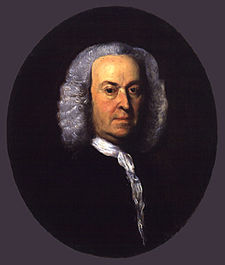Arthur Lee “in the light of a rival”
Yesterday I quoted two letters from Samuel Adams in 1771, the first recommending William Story to a lobbyist in London and the second warning the same man that Story might be conspiring with Gov. Thomas Hutchinson.
One might think that on receiving those two letters, Arthur Lee (shown here) would have passed on that warning to his fellow agent for Massachusetts interests, Benjamin Franklin. But that’s not how Lee operated.
Back in April 1770, the London merchant Dennis DeBerdt had died, opening up the job of representing the lower house of the Massachusetts General Court to British officials and lawmakers.
(Lord Hillsborough, the Secretary of State, soon took the position that there was no such job, that the legal agent for Massachusetts in London had to be approved by the Council and governor as well. Nevertheless, the house persisted in employing its own lobbyist.)
House speaker Thomas Cushing and most of the other, more moderate Whigs wanted to make Benjamin Franklin the body’s agent. He had represented colonial governments in London for many years, amassing a long list of clients. He thus already knew everyone in London and was the most famous, respected native of Massachusetts in the British Empire. Franklin was trying to present himself as the voice of all the American colonists, and having an official mandate from one of the larger and more oppositional provinces would strengthen that claim.
However, Franklin wasn’t always in tune with the Whigs back in America. He had misjudged how angry the Stamp Act would make people. He had told Parliament that colonists objected only to “internal taxes” and not tariffs, which shaped the design of the Townshend Acts. Franklin was also growing old—in his mid-sixties—and his attention was divided among many colonies.
For those reasons, Samuel Adams, James Otis, Jr., and some other radicals in the house preferred Arthur Lee—younger, more aggressive, firmly opposed to tariffs, and more recently in America. The result in November 1770 was a compromise, with Franklin the official representative but Lee, as the house told Franklin, ”their Agent in case of your Death or Absence from Great Britain.”
Did that make Franklin and Lee colleagues? Not to the younger man. In his letter to Adams on 10 June 1771, Lee accused Franklin of betrayal and explicitly described their relationship as a rivalry:
COMING UP: William Story in London and later.
One might think that on receiving those two letters, Arthur Lee (shown here) would have passed on that warning to his fellow agent for Massachusetts interests, Benjamin Franklin. But that’s not how Lee operated.
Back in April 1770, the London merchant Dennis DeBerdt had died, opening up the job of representing the lower house of the Massachusetts General Court to British officials and lawmakers.
(Lord Hillsborough, the Secretary of State, soon took the position that there was no such job, that the legal agent for Massachusetts in London had to be approved by the Council and governor as well. Nevertheless, the house persisted in employing its own lobbyist.)
House speaker Thomas Cushing and most of the other, more moderate Whigs wanted to make Benjamin Franklin the body’s agent. He had represented colonial governments in London for many years, amassing a long list of clients. He thus already knew everyone in London and was the most famous, respected native of Massachusetts in the British Empire. Franklin was trying to present himself as the voice of all the American colonists, and having an official mandate from one of the larger and more oppositional provinces would strengthen that claim.
However, Franklin wasn’t always in tune with the Whigs back in America. He had misjudged how angry the Stamp Act would make people. He had told Parliament that colonists objected only to “internal taxes” and not tariffs, which shaped the design of the Townshend Acts. Franklin was also growing old—in his mid-sixties—and his attention was divided among many colonies.
For those reasons, Samuel Adams, James Otis, Jr., and some other radicals in the house preferred Arthur Lee—younger, more aggressive, firmly opposed to tariffs, and more recently in America. The result in November 1770 was a compromise, with Franklin the official representative but Lee, as the house told Franklin, ”their Agent in case of your Death or Absence from Great Britain.”
Did that make Franklin and Lee colleagues? Not to the younger man. In his letter to Adams on 10 June 1771, Lee accused Franklin of betrayal and explicitly described their relationship as a rivalry:
I have read lately in your papers an assurance from Dr. Franklin that all designs against the charter of the colony are laid aside. This is just what I expected from him; and if it be true, the Dr. is not the dupe but the instrument of Lord Hillsborough’s treachery. . . .Thus, when Lee received Adams’s letter expressing doubt about William Story, he apparently said nothing about it to Franklin. He just let the older man shepherd Story around to royal officials and waited for another opportunity to undermine him.
I feel it not a little disagreeable to speak my sentiments of Dr. Franklin, as your generous confidence has placed me in the light of a rival to him. But I am so far from being influenced by selfish motives, that were the service of the colony ten times greater, I would perform it for nothing rather than you and America, at a time like this, should be betrayed by a man, who, it is hardly in the nature of things to suppose, can be faithful to his trust.
COMING UP: William Story in London and later.



